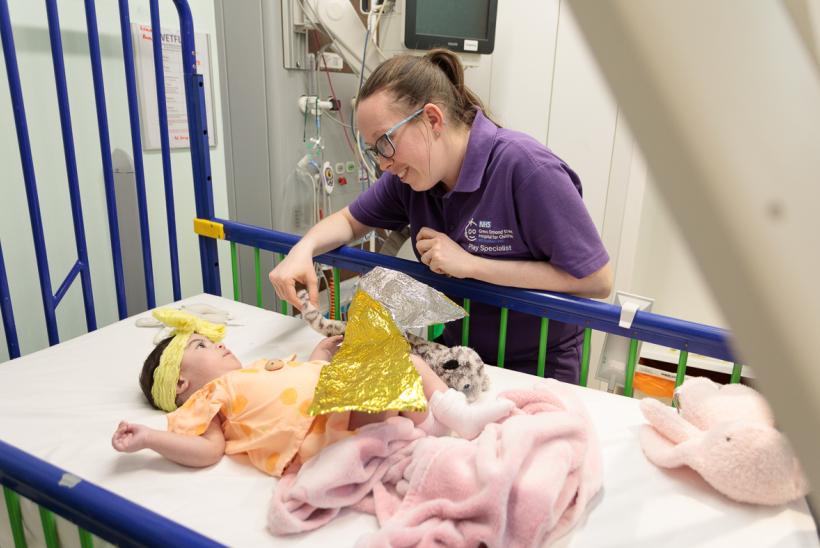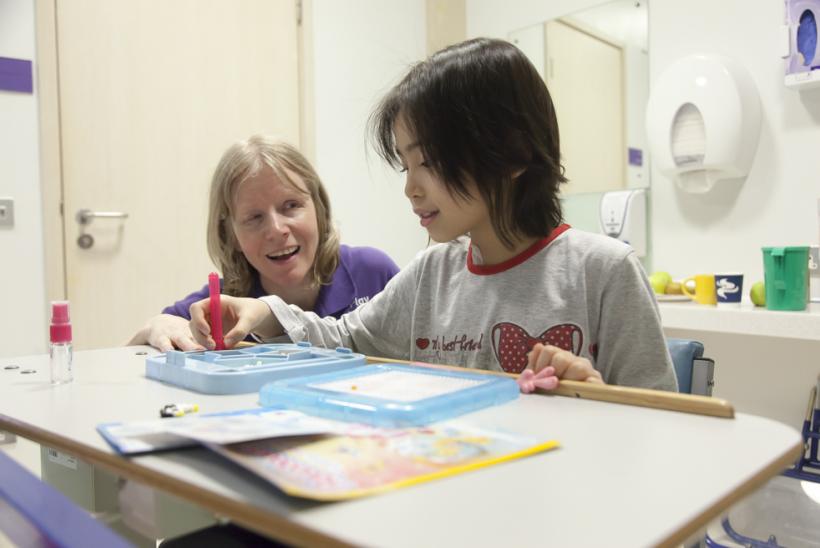Our play team
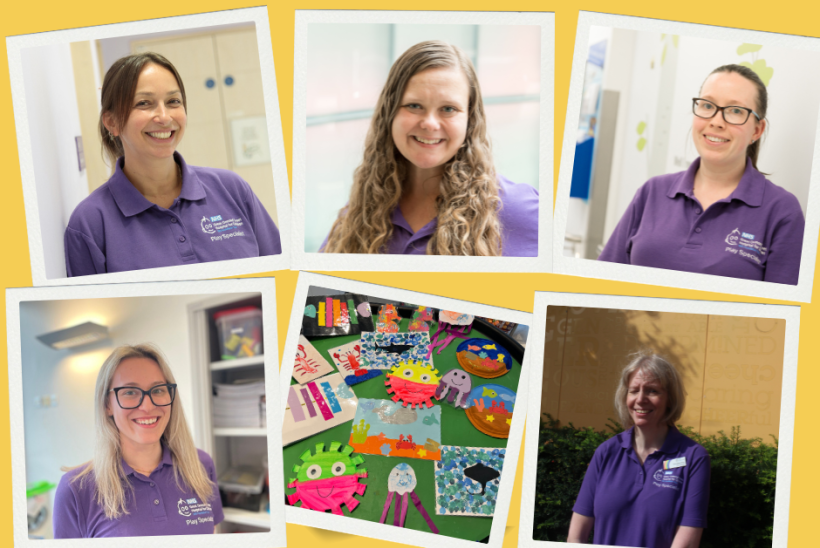
Play is important for patients and young people, especially when in hospital. With the largest hospital Play team in Europe, Great Ormond Street Hospital (GOSH) is dedicated to putting the Child First and Always and providing holistic care for our patients and families.
Play can help:
- Children and young people have a more positive experience of hospital
- Improve the wellbeing of children and reduces anxiety, fear and stress associated with being in hospital.
- Reduce a child’s feeling of pain associated with hospital treatment.
- When play and distraction are incorporated into hospital treatment, it can sometimes reduce the need for sedation.
- Children and young people in hospitals build resilience which helps them to cope and be better engaged with treatment.
- Give children their sense of control and autonomy back, which is often lost through illness and hospitalisation.
- Strengthen family wellbeing and relationship
Through playful engagement and exploration, our friendly and highly-skilled Play Team provide specialised therapeutic play which can be accessed both during outpatient clinics and on the wards to help patients cope with their diagnosis, condition, treatments and procedures. The team can also support children and young people to settle in and to make sense of what is happening in their treatment/intervention.
Moreover, the Play Team also provide general play activities, to help normalise patients’ experience at the hospital. As part of this, on every ward there are play team members and a stock of books, toys, and games.
Playworkers will support children and young people to access play materials and Play specialists use playful methods for preparation, distraction and post-procedural play.
Each day, the team of Health Play Specialists at GOSH come into contact with around 200-300 children. The play team helps patients and families in different ways:
- Preparing for procedures: Play specialists help children prepare for life-saving treatment and surgery using techniques such as role play, drawing and practicing procedures. Preparation can involve dolls, creativity and books to prepare children for a specific procedure, helping them to understand what the procedure will be like. Distraction techniques aim to take their attention away from treatments and procedures while they are happening, and assessment allows play staff to develop a play programme for children to reach goals during their hospital admission. For example, the team use distraction techniques to engage and distract children before and during blood tests, so that they have a more comfortable experience.
- Bringing fun into the hospital: Playworkers and Play Specialists work closely with patients and families to provide lots of fun activities tailored to the interests of each child. This helps patients maintain some normality and ensure children don't miss out on being children.
- Supporting the whole family: Playworkers and Health Play Specialists often form strong relationships with children by maintaining playfulness through treatment and can ensure that complicated medical information is communicated in a child-friendly way, this can alleviate the parents' worries of explaining complicated illnesses to their child. The play team can also provide families with a much-needed break.
- Speeding up recovery: Research shows that play can improve a child or young person’s recovery time. We think this is because doing a little of what you want to do and enjoy has a positive effect on their ability to cope with stress and to heal.
Diverse services provided by the Play department
The Play service at Great Ormond Street Hospital provides and supports opportunities for play to happen and also delivers specialist play preparation, all for children and young people in outpatient clinics and on the wards. All play is therapeutic and to be able to access play during treatment is an important part of retaining joy for children and young people (and their families). Play is the language of children and it is how children experience the world. Play builds relationships and trust between people.
There are Play Specialists and Playworkers throughout the hospital – they work as a team and have different roles. Here is some of what do they do:
Play workers (light purple shirt):
- Have a minimum level 3 in Playwork, Child Development or Childcare and education.
- Have an understanding of different theories of Child Development, this helps them to make an assessment play needs.
- Have experience and understanding of inclusivity and diversity in childhood and how to actively promote and support this.
- Enjoy supporting play opportunities and finding creative ways to make play possible when there are physical and emotional barriers.
- Give support and advice to parent and other care-givers on ways they can support play.
- Supports general play either in the play/adolescent rooms or at the bedside.
- Are playful.
- Are excellent at holding space for children’s play, they don’t dominate with their own agenda.
- Source creative, fun activities and social opportunities for children and young people while they are in hospital.
- Support children, young people and their families with the strategic use play-based techniques.
- Undertake observations and assessments relating to play sessions.
- Contribute to patient notes and documentation.
Play Specialists (deep purple shirt):
- All of the above – plus…
- A further qualification and training in Health Play Specialism or therapeutic play interventions.
- Help children and young people to recognise existing coping strategies and form new ones.
- Use their skills to Prepare children and young people for procedures and treatments by putting them in the driving seat and supporting understanding and myth-busting.
- Work with children, young people and families on the most effective ways to distract from procedures and treatments, when appropriate.
- Support children to make sense of what they are experiencing with the strategic use of play-based techniques.
- Offer distraction, relaxation and desensitisation techniques for children and young people undergoing medical procedures.
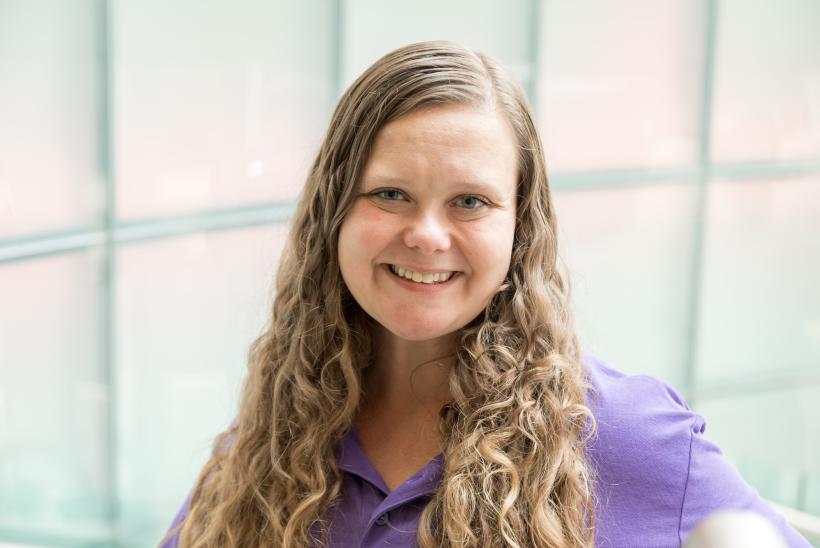
Emily Stone
Senior Health Play Specialist- Bumblebee Ward
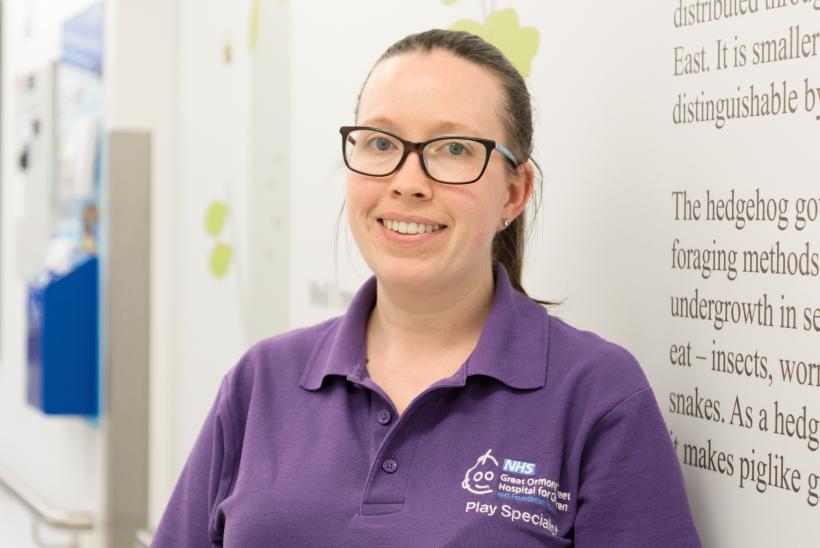
Kimberley Millar
Health Play Specialist- Hedgehog Ward
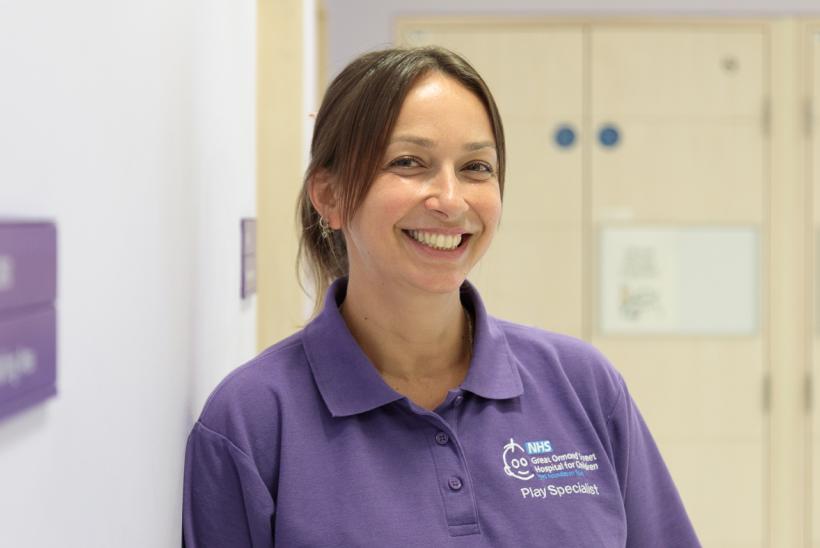
Claudia Monteiro
Health Play Specialist- Caterpillar Outpatients
Caroline Allan
Play Specialist- Butterfly Ward
Play team with patients
